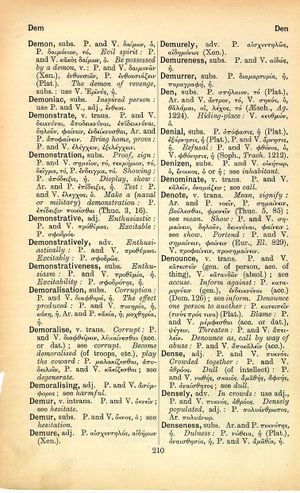demon: Difference between revisions
From LSJ
ἡγούμενος τῶν ἡδονῶν ἀλλ' οὐκ ἀγόμενος ὑπ' αὐτῶν → of his pleasures he was the master and not their servant
(nlel) |
m (Woodhouse1 replacement) |
||
| Line 1: | Line 1: | ||
{{Woodhouse1 | {{Woodhouse1 | ||
|Text=[[File:woodhouse_210.jpg|thumb|link={{filepath:woodhouse_210.jpg}}]] | |Text=[[File:woodhouse_210.jpg|thumb|link={{filepath:woodhouse_210.jpg}}]] | ||
===substantive=== | |||
P. and V. [[δαίμων]], ὁ, P. [[δαιμόνιον]], τό. | [[prose|P.]] and [[verse|V.]] [[δαίμων]], ὁ, [[prose|P.]] [[δαιμόνιον]], τό. | ||
[[evil spirit]]: [[prose|P.]] and [[verse|V.]] [[κακὸς δαίμων]], ὁ. | |||
[[be possessed by a demon]], v.: [[prose|P.]] and [[verse|V.]] [[δαιμονᾶν]] ([[Xenophon|Xen.]]), [[ἐνθουσιᾶν]], [[prose|P.]] [[ἐνθουσιάζειν]] ([[Plato]]). | |||
[[the demon of revenge]], subs.: use [[verse|V.]] [[Ἐρινύς]], ἡ. | |||
}} | }} | ||
{{esel | {{esel | ||
Revision as of 08:55, 20 May 2020
English > Greek (Woodhouse)
substantive
P. and V. δαίμων, ὁ, P. δαιμόνιον, τό.
evil spirit: P. and V. κακὸς δαίμων, ὁ.
be possessed by a demon, v.: P. and V. δαιμονᾶν (Xen.), ἐνθουσιᾶν, P. ἐνθουσιάζειν (Plato).
the demon of revenge, subs.: use V. Ἐρινύς, ἡ.

